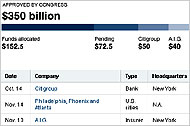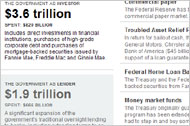Wall Street banks have taken billions of taxpayer dollars. Now some of them are starting to wonder if they should give the money back.
Even before the government announced its latest efforts to fix the troubled banking industry on Tuesday, executives at Goldman Sachs and Morgan Stanley said they wanted to repay the money quickly. Both banks received $10 billion under the first rescue plan last fall.
Paying back all those funds would be difficult in this tough economic environment. But banking executives worry that the government may intrude further into their businesses as long as they are beholden to Washington.
“We just think that operating our business without the government capital would be an easier thing to do,” said David A. Viniar, the chief financial officer of Goldman. “We’d be under less scrutiny, and under less pressure. Not that we’d be out of the public eye; we’re still going to be in the public eye.”
The issue is likely to draw close scrutiny on Wednesday, when executives from eight banks are scheduled to testify on Capitol Hill. The efforts to break free of government support reflects a growing trepidation among Wall Street’s largest players about their independence and the new rules that may be imposed on them because they accepted federal capital.
In recent weeks, the Obama administration has announced that banks will have to disclose more information about their spending and cap executive pay at $500,000. Several lawmakers have gone further with proposed measures about compensation for all bank employees as well as halting certain types of immigration visas for companies that received government money.
Industry groups say the new rules are unfair.
“The contract says that Congress can change the law, and we were obviously concerned,” said Scott Talbott, senior vice president for government affairs for the Financial Services Roundtable. “But we didn’t think they would tip the scales this far. The more of these retroactive rules they place on institutions, the more institutions will look for an exit strategy.”
But the banks are likely to find that escape is a distant hope, analysts said. The government required banks to replace taxpayer money with new equity — in the form of common stock or preferred shares — before any repayment. And the markets for raising capital are all but dead, especially for financial companies.
Banks are not allowed to repay the government money out of their earnings for three years, though some bank executives are privately saying they think the government may reverse that rule for banks if they start earning money again. After all, bank executives said, it may be beneficial for the government to show taxpayers that some banks are regaining their financial strength.
Still, it is unclear that it would make sense for banks to repay the government money, given the uncertain outlook for their businesses, analysts said. One chief executive of a major bank said last week that he feared returning the money first would leave his bank as “the only one in the water without shark repellent.”
And, in a market of quickly shifting fortunes, any bank that returned capital could find itself in need again months later. Bank of America, for instance, was among the companies that appeared to be in a stronger position last fall when regulators met with chiefs of the eight banks. But at the end of the year, as the outlook for its merger with Merrill Lynch soured, the bank returned to the government for a second round of assistance. Citigroup has also received a second bailout.
And government funds are cheap with interest payments of only 5 percent and a few percentage points more for related warrants. Banks are unlikely to find other parties that would offer them such low rates, analysts said.
“I don’t think anyone should be in a hurry to pay it back,” said Jeffery Harte, a banking analyst at Sandler O’Neill. “But if you could prove able to pay it back, especially when other institutions are coming back for a second or third helping, it would send a pretty strong message to the market.”
Many banks have also issued new debt in recent months backed by the government. The program, run by the Federal Deposit Insurance Corporation, has received far less attention than the capital injections, but it represents another subsidy to banks, which otherwise would have found issuing debt more expensive, or impossible. Banks that repay taxpayer money may still be beholden to the government if they issued these government-backed bonds.














